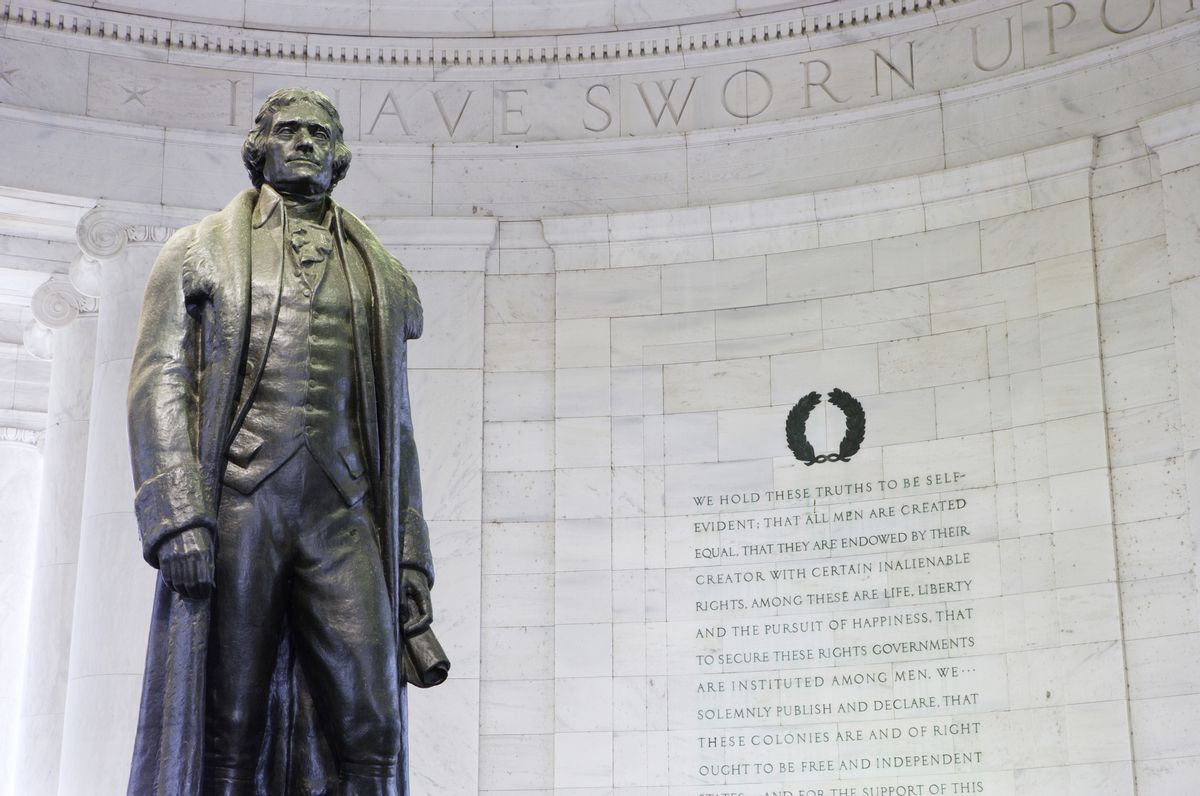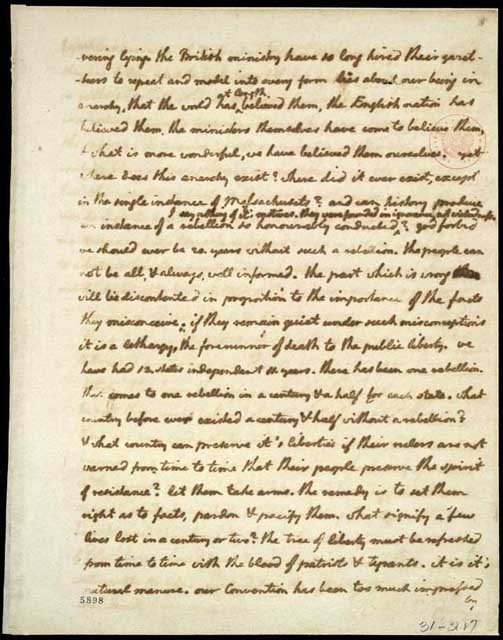A viral quote from Thomas Jefferson, the third president of the United States, is frequently shared by groups who seemingly support some sort of violent uprising. On Sept. 10, 2019, the quote — "The tree of liberty must be refreshed from time to time with the blood of patriots and tyrants" — was included in a political comic from conservative cartoonist Ben Garrison:
New #BenGarrisonCartoon for your #TuesdayThoughts Is it time to water the Tree of Liberty? great post by Ben at https://t.co/YHtjj9iXGc pic.twitter.com/Cd7C3Iazch
— GrrrGraphics Cartoons (@GrrrGraphics) September 10, 2019
In Garrison's version, the "tree of liberty" is being destroyed by Democrats, Google, globalism, communism and the Illuminati (we're not entirely sure what the bird on the right is supposed to represent in the cartoon). The inclusion of Jefferson's quote seems to imply that the "tree of liberty" can only be revived via a violent rebellion against these groups and ideas.
This is a genuine quote from Jefferson. However, it is missing a bit of context.
This quote comes from a letter Jefferson wrote to William Stephens Smith on Nov. 13, 1787, about Shay's Rebellion in Massachusetts. While Jefferson, who was living in France at the time, seemed to support that rebellion and other such violent uprisings, he also noted in his letter that such acts were often founded by ill-informed groups. The remedy to these uprisings, according to Jefferson, was to "set them right as to facts, pardon & pacify them."
A transcription of this letter, as well as an image of this letter from the Library of Congress, can be glimpsed below:
The British ministry have so long hired their gazetteers to repeat and model into every form lies about our being in anarchy, that the world has at length believed them, the English nation has believed them, the ministers themselves have come to believe them, & what is more wonderful, we have believed them ourselves. yet where does this anarchy exist? where did it ever exist, except in the single instance of Massachusets? and can history produce an instance of a rebellion so honourably conducted? I say nothing of it's motives. they were founded in ignorance, not wickedness. god forbid we should ever be 20 years without such a rebellion. the people cannot be all, & always, well informed. the past which is wrong will be discontented in proportion to the importance of the facts they misconceive; if they remain quiet under such misconceptions it is a lethargy, the forerunner of death to the public liberty. we have had 13. states independant 11. years. there has been one rebellion. that comes to one rebellion in a century & a half for each state. what country before ever existed a century & half without a rebellion? & what country can preserve it's liberties if their rulers are not warned from time to time that their people preserve the spirit of resistance? let them take arms. the remedy is to set them right as to facts, pardon & pacify them. what signify a few lives lost in a century or two? the tree of liberty must be refreshed from time to time with the blood of patriots & tyrants. it is it's natural manure.
This quote, at least the selection that appeared in Garrison's cartoon, has previously been employed to justify acts of war, rebellion, and violence. The quote was also scrawled across the shirt-back of American domestic terrorist Timothy McVeigh, who killed 168 people when he blew up a federal building in Oklahoma City, when he was arrested in 1995.
A few days after the terrorist attacks of Sept. 11, 2001, author Jim Wooten also used this quote as the basis of an op-ed in The Atlanta Constitution calling on young people to sacrifice and join the military because the "tree of liberty" needed to be refreshed:
While this is a genuine quote from Jefferson, both its meaning and what this quote says about Jefferson himself remains up for interpretation. In September 2016, Andrew Holowchak, the author of several books on Jefferson, including "Framing a Legend: Exposing the Distorted History of Thomas Jefferson and Sally Hemings," explored the meaning of this quote in an article published on the History News Network.
Holowchak wrote that scholars had interpreted this quote in different ways over the years. Some argued that this letter was atypical of Jefferson and showed that he had a sanguinary streak in him. Others believed that the letter wasn't at all surprising because Jefferson, an author of the Declaration of Independence, was well-versed in revolutions:
This oft-referred-to passage, an apologia for the actions of farmers and other dissenters in Massachusetts (the rebellion began in 1786 and continued in pulses till June of 1787), has perplexed scholars for decades, because the general reaction of others in Jefferson’s day (e.g., Henry Knox and George Washington) was alarm or even panic. Why was not Jefferson alarmed or panicked? What became apparent to many was that the Articles of Confederation disallowed a strong central government, impotent in such a crisis. Moreover, the rebellion illustrated the fragility and tenuousness of the union. Consequently, Jefferson’s response in the letter is not just atypical, but also customarily interpreted as evidence of a sanguinary streak in him.
The letter, many scholars assert, is just one more instance of Jefferson’s hypocrisy. Conor Cruise O’Brien develops a radical thesis around it and a few similar letters in The Long Affair. The letter to Smith is an attempt to rationalize the violence of Shay’s Rebellion. Jefferson, he thinks, would have been at ease with “the most militant segment of the modern American militias.” Peter Onuf in The Mind of Thomas Jefferson mentions Jefferson’s avowed cowardice apropos of Benedict Arnold’s invasion of Virginia. He refers to the tree of liberty statement in the letter to Smith to show Jefferson, “himself no hero,” was “eager enough that others should die.” He sums, “Here, for skeptical military men, were the classic symptoms of civilian bloodthirstiness, justifying itself by appeal to the most exalted ideological principles.” Gordon Wood in Empire of Liberty notes that Jefferson was a radical revolutionist, at least in his early political career. He quotes from a British guest at a dinner partner with Jefferson, “[Jefferson] cannot live but in a revolution, and all events in Europe are only considered by him in the relation they bear to the probability of a revolution to be produced by them.” C. Vann Woodward in The Future of the Past, sees nothing astonishing in the letter. “This comes as no surprise from the author of the Declaration of Independence.” He adds that Jefferson, regarded as “Mr. Revolution” in France, was construed to be the “leading world authority on the subject.”
Holowchak also warned against forming an opinion on Jefferson, or on Jefferson's views, from a single sentence:
Other scholars urge caution concerning taking the metaphors too straightforwardly. Dumas Malone says Jefferson was “far more aware than most of [his contemporaries] of the everlasting dangers of tyranny and force. Rebellion — occasional rebellion — on the part of men nurtured in self-government seemed to him much the lesser evil.” Alf Mapp writes in Thomas Jefferson: America’s Paradoxical Patriot, “So great is the volume of Jefferson’s correspondence that even a tiny proportion of it written with unguarded hyperbole affords numerous quotations for the use of those who portray him as an extremist.”
We reached out to the Thomas Jefferson Foundation for their interpretation of this quote. We will update this article if more information becomes available.



